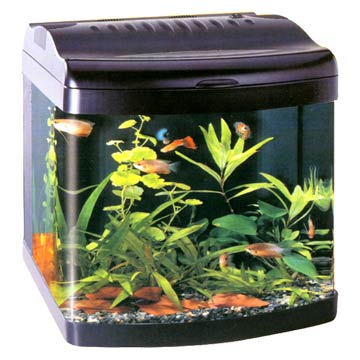
I have a thing for fishes. I love to keep them as pets. You know why? Cause they won't bother you when they need food like how a dog or a cat would come to you and giving you their 'Please-feed-me-I-am-hungry' face. Fishes will just swim and wait for you to feed them. However, many of us didn't realise that it's not easy to take care of fishes. It's not as simple as feeding them and letting them swim in the aquarium. You got to know about the water's pH, temperature and many more stuff as those little things will affect the fishes life!

The first thing would be the pH of the aquarium water. Different fishes have different pH requirement. Some needs to live in a more alkaline environment while some are able to live in a neutral environment. There are a few things that will affect the pH of the water. One of them is the chemical additives that are added directly into the water either to lower or raise the pH of the water. Besides that, shells and corals that are in the aquarium will also affect the pH of the water as it will increase the alkaline level of the water. Fishes are very sensitive to the water pH and they can die if they cannot adapt to the changes.
Related to the water pH would be the water hardness. Water hardness simply means the level of mineral in the water. Hard water has a lot of dissolved minerals in the water while soft water has very little or none dissolved minerals in the water. The most common mineral found in the water would be the calcium. The softness or hardness of the aquarium water normally depends on the tap water. The tap water on the other hand depends on the source of water. Hard water usually have higher pH value. The minerals in hard water will act as buffers which will reduce the amount of acid in water. Thus, the water will be more alkaline.
Besides that, ammonia, nitrites and nitrates that are parts of the breakdown of waste materials in the aquarium also affects the water of the aquarium. Some of these waste materials are harmful towards the fishes in the aquarium. Ammonia is released when wastes from fishes, plants and the food breaks down. Ammonia is very toxic and harmful to fishes and must be converted to nitrite by bacteria. Nitrite is also toxic and gives harm to the fishes and must be convereted into nitrate. Nitrate on the other hand is less toxic and they are normally taken up by plants to help the plants in their growth.
There are also chlorine and chloramine (combination of chlorine and ammonia) present in our water supplies. They are harmful towards the fishes and must be removed. Chlorine can be removed by dechlorinating agents such as a bottle of anti-chlorine that is sold in a pet store while chloramine can only be removed using a special chemical agents.

Here, this basically sums up what you need to know about the chemistry that happens in your aquarium. So if you have an aquarium at home and are not aware of this, please do read it up and take care of your fishes! They are such cute little creatures. :)
"Just Keep Swimmingggggg", sings Dory.



No comments:
Post a Comment